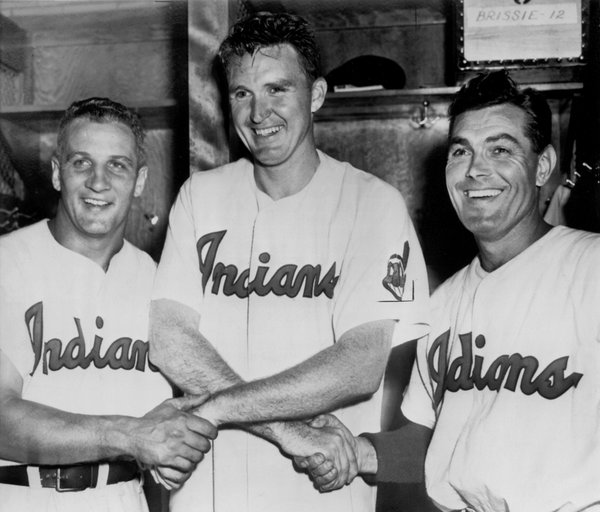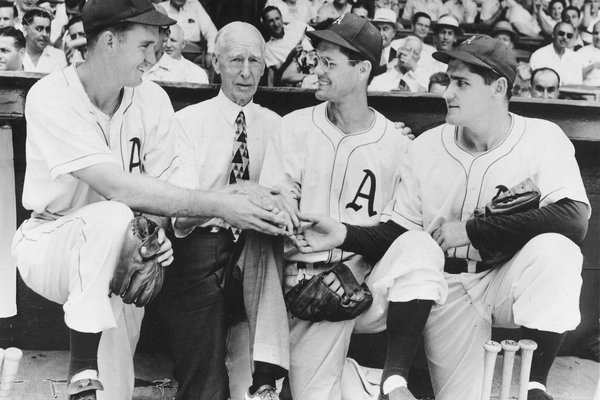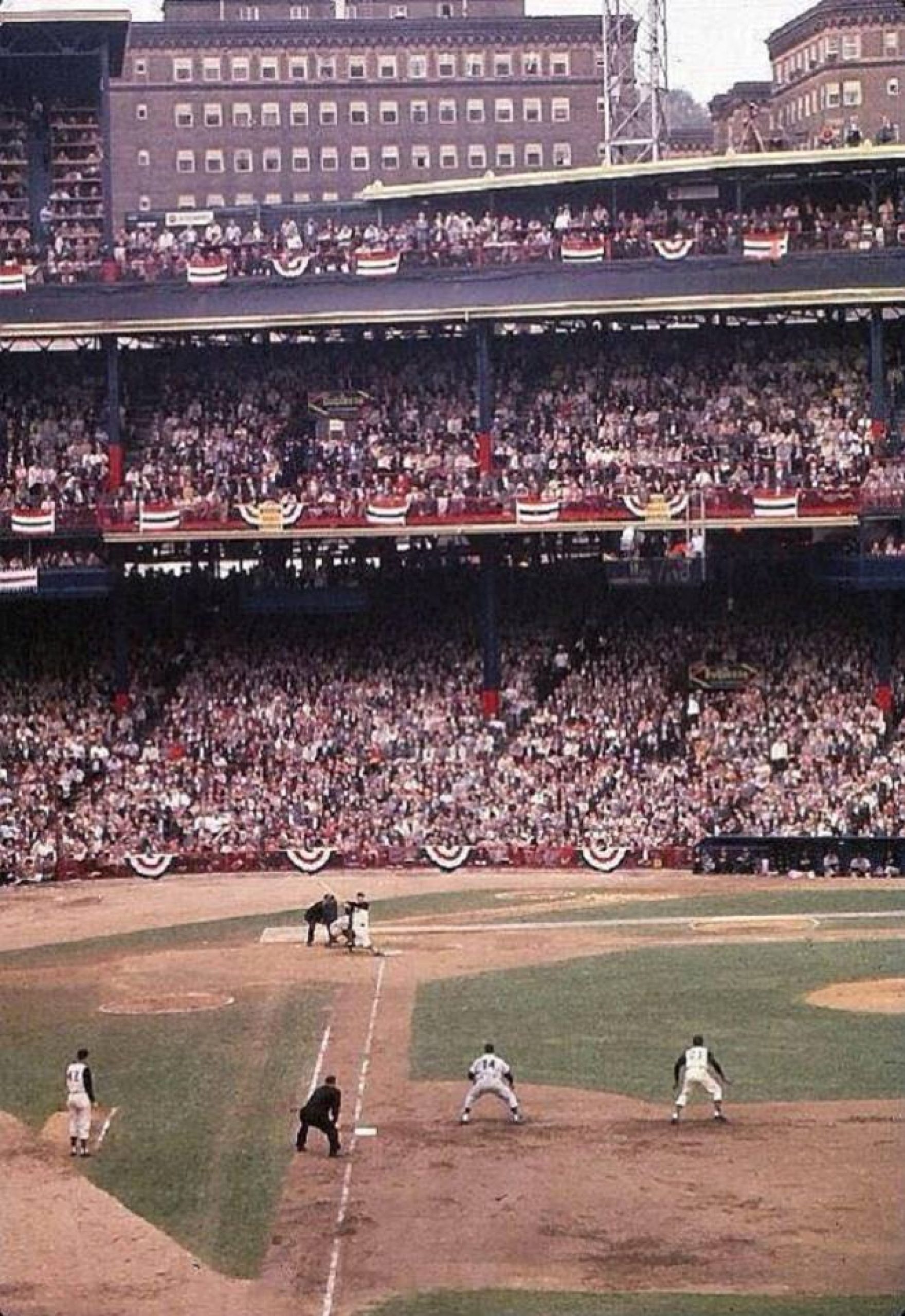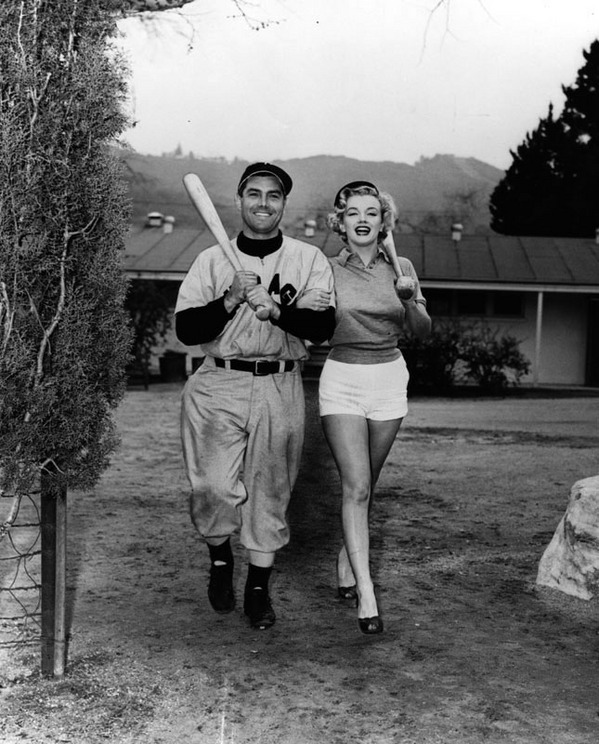Baseball History Comes Alive Now Ranked #2 by Feedspot Among All Internet Baseball History Websites and Blogs!
Guest Submissions from Our Readers Always Welcome!
Scroll Down to Read Today’s Essay
Subscribe to Baseball History Comes Alive for automatic updates. As a Free Bonus, you’ll get instant access to my Special Report: Gary’s Handy Dandy World Series Reference Guide!
Today we welcome back Vince Jankoski with a fine edition to our “Forgotten Stars” series, with an interesting essay on Hank Majeski. I was familiar with him, but Vince really filled in the gaps as to what a fine ball player Hank Majeski was. And how about the featured photo of Hank with Miss MM! -GL
Another Edition of:
“Forgotten Stars”
Staten Island’s Finest, Hank Majeski
Staten Island has always been one of my favorite places. The forgotten borough, more suburban than city, more Republican than Democrat, it has always been an outlier in everything New York City. Until the construction of the Verranzano Narrows Bridge in the mid-1960’s, it was accessible to the other boroughs only by ferry. Surrounded by New Jersey on three sides, urban legend has it that it was assigned to New York because New York was the victor in a boat race around the island. It has been attempting to secede ever since.
When one thinks of Staten Island and baseball, one thinks of Bobby Thomson who, after striking the “Shot Heard Round the World” retreated to his Staten Island residence. But Thomson was a Scot, born in Glascow, not a native Staten Islander. There is also the “Staten Island Sinker” a/k/a the spit ball, supposedly named for native Staten Islander George Bamberger, the longtime pitching coach for the Baltimore Orioles.
New Jersey teenagers of my generation referred to Staten Island simply as “The Island”. By contrast, to contemporaries in New York, “The Island” was a reference to the more populous and popular Long Island. In those days, Staten Island was considered a series of watering holes for those 18-21 year olds (sometimes younger) too young to consume alcohol in New Jersey. The trip home over the Outerbridge Crossing could be interesting.

Back to baseball. Who is the best baseball playing native Staten Islander? Some readers may think that this is like asking who is the best hockey player in Guatamala? But baseball has been played in Staten Island as long as baseball has been played. So, the question has meaning.
My nomination for best baseball playing native Staten Islander is the overlooked and very underrated Hank Majeski. For the reason noted above Bobby Thomson doesn’t count. Same for John Franco who was born in Brooklyn, Jason Marquis who was born in Manhasset, and Mookie Wilson who was born in Bamberg, SC.

Hank Majeski was born on The Island and raised in The Island’s Port Richmond section, on the island side of the Bayonne Bridge – the span destroyed by aliens in the 2005 remake of War of the Worlds. Majeski first came up to the majors as a 22-year-old third baseman with the Boston Braves. He hit a respectable .272, but the following year manager Casey Stengel decided to go with Sibby Sisti as his regular third-sacker (go figure). Majeski was sent down to Newark where for three seasons he feasted on International League pitching, hitting .323, .303, and .345 in successive seasons. During this time, he became the property of the Yankees. Unfortunately, the Yanks had All-Star Red Rolfe manning third, so Majeski remained at Newark. By 1942, Rolfe was fading, yet Majeski stayed planted in Newark.
Three years of service in the Coast Guard followed. In 1946, Majeski was sold to the Philadelphia Athletics where as a 29-year-old, he got his chance to play regularly. Hit hit only .250 in 293 plate appearances for the A’s that year, but the next two seasons showed what he could do.
Always a good fielder, in 1947, he set an MLB record for fielding percentage as a third baseman (.988) which stood for 27 years while batting .280. Never much of a power hitter, the following year he hit .310 with 120 RBIs, remarkably with only 12 home runs. After hitting .277 in 1949, he was traded to the White Sox where he batted .309. Sent back to the A’s during the 1950 season, he hit .282 in his last year as a full-time player. By 1951, he was 34 years old and was limited in his playing time. Nevertheless, he held on as a part-time player for another 4 seasons and struck a pinch-hit home run for the Cleveland Indians in the 1954 World Series. For his career, he batted .279 with a respectable on-base percentage of .342.
Especially unappreciated is Majeski’s fielding. He was a great fielder. I mean, the man brought his glove to the ballpark. In addition to setting the record for fielding average in a season in 1947 a year in which he made only 5 errors in 134 games, his range factor per 9 innings that season was 3.25. To put that number in perspective, Brooks Robinson won six consecutive Gold Gloves from 1961-1966 with range factors never getting above 3.13 chances per 9 innings. My man Hank could go get the ball.
Furthermore, Majeski’s career fielding stats compare favorably with Hall of Famer Robinson’s. Majeski’s career range factor per 9 innings for games played at third base is 3.29 versus 3.20 for Robinson. Hank’s career fielding average at the hot corner was .968, slightly lower than Robinson’s .971. Majeski’s fielding compares favorably with Robinson’s, a player whose HOF ticket was punched with his glove. You gotta appreciate that.
So, there it is – my nomination for best Staten Islander in major league history. I welcome dissent.
Vince Jankoski
Subscribe to our website, Baseball History Comes Alive with over 1500 fully categorized baseball essays and photo galleries, now surpassing the one million hits mark with over 1,190,000 hits and over 950 subscribers: https://wp.me/P7a04E-2he
Information: Excerpts edited from


Nice work Vince. Hank sure looks happy walking arm in arm with Marilyn. I bet she never visited Staten Island!
Fine research as usual, Vince. And your essay got a nice boost with those MM legs!
The fielding range stats for Majeski are impressive–didn’t know he was that brilliant at third base.
Interesting that his career OPS + was 100, exactly league average. But, as you point out, 1948 was his best batting year with a .310 along with 12 homers and a remarkable 120 RBI.
In those days batters were often better situational hitters–making contact without crazy wrap-around homerun swings.
2019, the year of the “Rocket Ball” in the National League, saw Pete Alonso smack a rookie record 53 homers with 120 RBI but whiff 183 times. Hank Majeski struck out only 43 times in ’48.
(Pete improved three year later with exactly the same number of official at-bats driving in 131 runs, batting 11 points higher and striking out 55 fewer times. With the benefit of only a “paltry” 40 circuit smashes. Better year in my book. Then he hurt his wrist.)